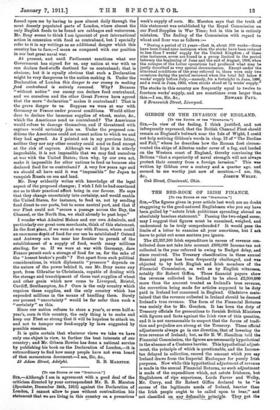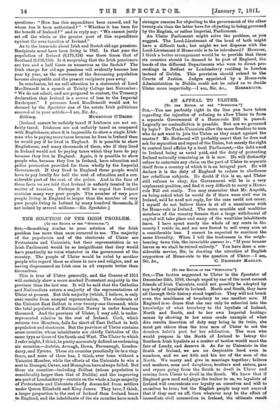THE BED-ROOK OF IRISH FrNANCE.
[To THY EDITOR OF THZ 'SPECTATOR."] SIR,—The figures given in your article last week are no doubt staggering to the good-natured Englishmen who you say have been gulled by "astute Irish politicians spreading abroad an absolutely baseless statement." Passing the two-edged sneer, may I suggest that figures must be examined, weighed, and understood to be truly comprehended ? It would pass the limits of a letter to examine all your assertions, but I ask leave to point out some matters you ignore.
The 2'2,357,500 Irish expenditure in excess of revenue con- tributed does not take into account 2600,000 Income-tax not collected in the year referred to owing to Budget delay, and since received. The Treasury classification in these annual financial papers has been frequently challenged, and was objected to by both English and Irish members of the Financial Commission, as well an by English witnesses, notably Sir Robert Giffen. These financial papers show the revenue collected in Ireland to be about 22,000,000 more than the amount treated as Ireland's true revenue, the correction being made for articles supposed to be duty paid in Ireland but consumed in England. Gladstone main- tained that the revenue collected in Ireland should be deemed Ireland's true revenue. The form of the Financial Returns was mainly due to Mr. Goschen. It has been the duty of Treasury officials for generations to furnish British Ministers with figures and facts against the Irish view of this question, and it is not unreasonable to suspect that the forces of tradi- tion and prejudice are strong at the Treasury. These official adjustments always go in one direction, that of lowering the true revenue of Ireland; but, as Sir E. W. Hamilton told the Financial Commission, the figures are necessarily hypothetical in the absence of a Customs barrier. This hypothetical adjust- ment, the principle of which is questionable, and the Income- tax delayed in collection, exceed the amount which you say Ireland draws from the Imperial Exchequer for purely Irish purposes. Now while this hypothetical adjustment of revenue is made in the annual Financial Returns, no such adjustment is made of the expenditure which, not astute Irishmen, but Englishmen of ripe experience, Lords Farrer and Welby, Mr. Curry, and Sir Robert Giffen declared to be "in excess of the legitimate needs of Ireland, heavier than the Irish people ought to be called upon to bear," and not classified on any defensible_klinciRle. They it the
questions : "How' has this expenditure been caused, and by whom has it been authorised P" "Whether it has been for the benefit of Ireland P" and in reply say: "We cannot justly set off the whole or the greater part of this expenditure against the over-taxation of Ireland."
As to the innuendo about Irish and Scotch old-age pensions. Recipients must have been living in 1841. In that year the population of Ireland (8,175,124) was three times that of Scotland (2,620,184). Is it surprising that the Irish pensioners are two and a half times as numerous as the Se,oteh ? The Irish charge for old-age pensions will evidently become less year by year, as the survivors of the decreasing population become chargeable and the present recipients pass away.
In conclusion, let me call attention to a statement of Lord MacDonnell in a speech at Trinity College last November : "We do not admit, and are prepared to contest, the Treasury declaration that Ireland is a source of loss to the Imperial Exchequer." I presume Lord MacDonnell would not be deemed by the Spectator one of the astute Irish politicians sneered at in your article.—I am, Sir, &c., [Ireland cannot be unfairly taxed if Irishmen are not un- fairly taxed. Irishmen are not unfairly taxed as compared with Englishmen, since it is impossible to show a single Irish- man who is paying more taxes because he lives in Ireland than he would pay if he lived in England. It is possible to show Englishmen, and many thousands of them, who if they lived in Ireland would not be paying taxes which they have to pay because they live in England. Again, it is possible to show people who, because they live in Ireland, have education and police protection provided for them wholly by the Imperial Government. If they lived in England these people would have to pay locally for half the cost of education and a con- siderable part of the cost of the police. And in the face of these facts we are told that Ireland is unfairly treated in the matter of taxation. Perhaps it will be urged that Ireland contains many very poor people. The number of very poor people living in England is larger than the number of very poor people living in Ireland by many hundred thousands, if not indeed by several millions.—En. Spectator.)



















































 Previous page
Previous page